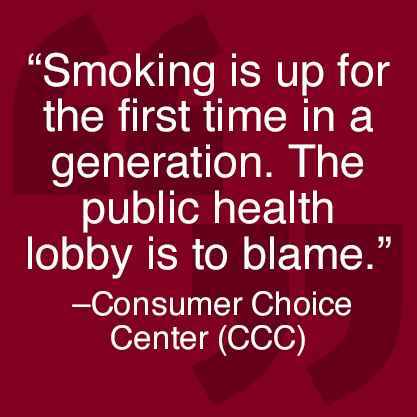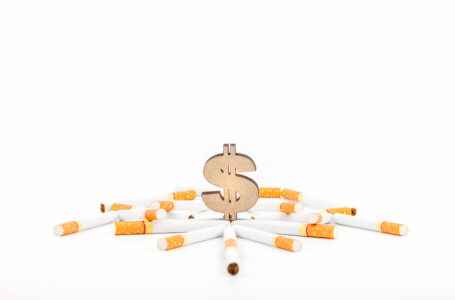A consumer group blamed public health lobby against vaping and aversion to innovation in the market for contributing to the return of smoking in the United States, with cigarette sales picking up year-on-year in 2020 for the first time in two decades.
“If we want to reclaim a true public health victory and help smokers quit to give them long and fruitful lives, it is time to cast aside this aversion to the innovations of the market. The future health of our nation depends on it,” the Washington D.C.-based Consumer Choice Center (CCC) announced on its website.

“Smoking is up for the first time in a generation. The public health lobby is to blame,” said the CCC, a consumer advocacy group supporting lifestyle freedom, innovation, privacy, science and consumer choice. It focuses on main policy areas such as digital, mobility, lifestyle and consumer goods and health and science.
Top publications highlighted the “comeback” of cigarettes among the bourgeois hipster crowd in Brooklyn, New York amid the misconception that switching back to cigarettes would be healthier than vaping, according to CCC.
Yaël Ossowski, deputy director of CCC, said the 2020 Cigarette Report of the Federal Trade Commission showed that cigarette sales grew in 2020 from the previous year.
“The total number of cigarettes reported sold by the major manufacturers, 203.7 billion units in 2020, increased by 0.8 billion units (0.4 percent) from 2019, the first increase in cigarettes sold in 20 years,” according to the report.
“Whatever your conclusion, the trend that lowered the percentage of US smokers down to 14 percent in 2019 when the last complete nationwide survey was completed is halting. And that should concern us all,” the CCC said.
The CCC said a likely contributor to the increase in smoking rate is the public health lobby against harm reduction or the use of less harmful alternatives to cigarettes such as e-cigarettes and heated tobacco products.
“Nothing has been more egregious and harmful in our current age than the public health lobby’s persistent denialism of the harm reduction value of nicotine vaping products and other alternatives to cigarettes,” the organization said.
It said the persistent public health campaigns, echoed by headline-grabbing media outlets, to demonize and restrict access to vaping has led to a predictable rise in smoking rates, both among adults and teens.
The CCC expressed alarm over public information campaigns demonizing vaping devices, misinformation on lung illnesses caused by tainted cannabis cartridges, bans, restrictions and taxes on flavored nicotine products (especially those without tobacco), Kafkaesque market authorization applications handled by the drug regulators, and a never-ending crusade to deny adult consumers from having access to life-saving products because of illicit and risky behavior by teens.
“These public health bodies, anti-smoking groups and allied journalists, whatever their intent, have sought to convince the public that not only is smoking bad and dangerous—an easy admission—but also that alternative nicotine devices like vaping products, nicotine pouches, and heated tobacco are just as or even riskier than a pack of smokes,” the CCC said.
The public health mission to muddy the popular perception of nicotine alternatives such as vaping, which is scientifically proven to be 95 percent less harmful than cigarettes, is causing actual damage to American public health, it said.
“That proof is found both in the increased sales of cigarettes nationwide and also in a highly concentrated study on teen smoking in a jurisdiction where flavored nicotine vaping was outlawed,” the CCC said.
A study published in JAMA Pediatrics found that more teens took up smoking after San Francisco banned flavored vaping and tobacco products. The study noted that “San Francisco’s ban on flavored tobacco product sales was associated with increased smoking among minor high school students relative to other school districts.”
“Whatever your view on whether vaping devices, heated tobacco, snus, or nicotine pouches are the most attractive and effective gateway away from smoking, this recent uptick in smoking demonstrates actual harms result when politically-charged health lobbies seek to extinguish market alternatives. And we must ask why they persist,” the CCC said.
The CCC said it is the vape shop owners, makers of vape liquids, gas station owners, vaping technology firms, tobacco firms pivoting to alternative products, and an entire creative class of vaping influencers both on and offline who are trying to give smokers a second chance at a long life. “These are the true heroes of harm reduction in the 21st century,” the CCC said.
It said the fact that spontaneous markets can deliver helpful and healthier solutions because of consumer demand, rather than by edicts, funding, and programs directly controlled by public health bureaucracies and agencies, runs counter to much of the ideology in the tobacco control space.



















